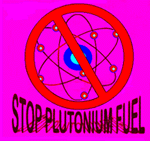|
The US Department of Energy plans to turn more than 36 tons of plutonium into commercial nuclear power reactor fuel UPDATE: April 7, 2000 - Virginia Power drops out of Plutonium Fuel Consortium. Virginia Power has announced that it's dropping its plans to burn Plutonium fuel at its North Anna Nuclear Power Plant in Louisa County, Virginia. Duke Energy has said it will stay in the Plutonium fuel program. We are at a turning point in history. At the close of the Cold War the United States has a toxic legacy comprised of 50 tons of so-called surplus plutonium from dismantled nuclear warheads. The US Department of Energy (DOE) plans to convert most of the warheads into civilian nuclear reactor fuel. On March 22, 1999 DOE awarded a $130 million contract to design the plutonium fuel plant to an industry group led by Duke Engineering & Services. The group is led by Duke Energy and includes Virginia Power, French nuclear fuel manufacturer COGEMA, and Stone & Webster. The utilities would use the fuel at the Maguire and Catawba reactors near Charlotte and the North Anna reactors in Virginia. Previously, DOE designated South Carolina's Savannah River complex as the preferred site for plutonium disassembly and conversion of plutonium warheads into fuel, also called MOX - a Mixed OXide of plutonium and uranium. In January, the Nuclear Control Institute in Washington released a study which says that the Energy Department severely underestimated the safety risks of using civilian power reactors to dispose of plutonium. Dr. Edwin Lyman, an energy physicist and the author of the report, said that in the event of a severe reactor accident plutonium fuel would release a much larger burst of highly radioactive and toxic materials known as actinides including plutonium, americium, cesium, and curium. This could cause thousands of additional cancer deaths in North Carolina, South Carolina, and Virginia. Dr. Lyman said, "Duke Power does not plan to install additional control rods in its reactors, or to place limits on the irradiation time of the plutonium fuel. Duke is cutting corners in a way which could seriously impact safety." Don't Let the Southeast Become Plutonium Alley Blue Ridge Environmental Defense League opposes the use of plutonium fuel in commercial nuclear power reactors for environmental, public health, and national security reasons. The reversal of a two decade policy prohibiting the use of plutonium in reactors would put a strategically valuable and dangerous material, which is now in the hands of the armed forces, under the control of electric utilities. Ironically, this swords-into-plowshares alchemy by DOE would not reduce the nation's stockpile because it would create new plutonium at a rate similar to its destruction in a power reactor, yielding new plutonium for old. When you add to this the environmental consequences of plutonium reprocessing and the additional risks of new breeder reactors, you end up with an environmental nightmare. The financial estimate of DOE's plutonium disposition project runs into the billions. The price of a plutonium oxide fuel fabrication plant at Savannah River will cost taxpayers over one billion dollars. The omnibus appropriations bill for FY99 contains $225 million to upgrade Russian reactors and MOX infrastructure. There is the question of a $900 million fuel credit from DOE for plutonium. To this add the open-ended costs of direct subsidies to domestic utilities for plutonium fuel. Before this project goes any further, the DOE budget for surplus plutonium disposition activities should be suspended until we have a complete accounting of the project. Citizens have the right to know about the costs and risks of a plutonium fuel economy and MOX . plutonium is not “burned” What can we do about it? A blizzard of letters and calls to
officials. Feel free to use information in
this action alert. 1 - Call or write the US Department of
Energy. Ask for formal public hearings on
MOX to be held in cities near the nuclear
reactors selected for MOX: Charlotte NC ,
York SC, and Charlottesville VA. For assistance and more information contact: The BLUE RIDGE ENVIRONMENTAL DEFENSE LEAGUE
|
